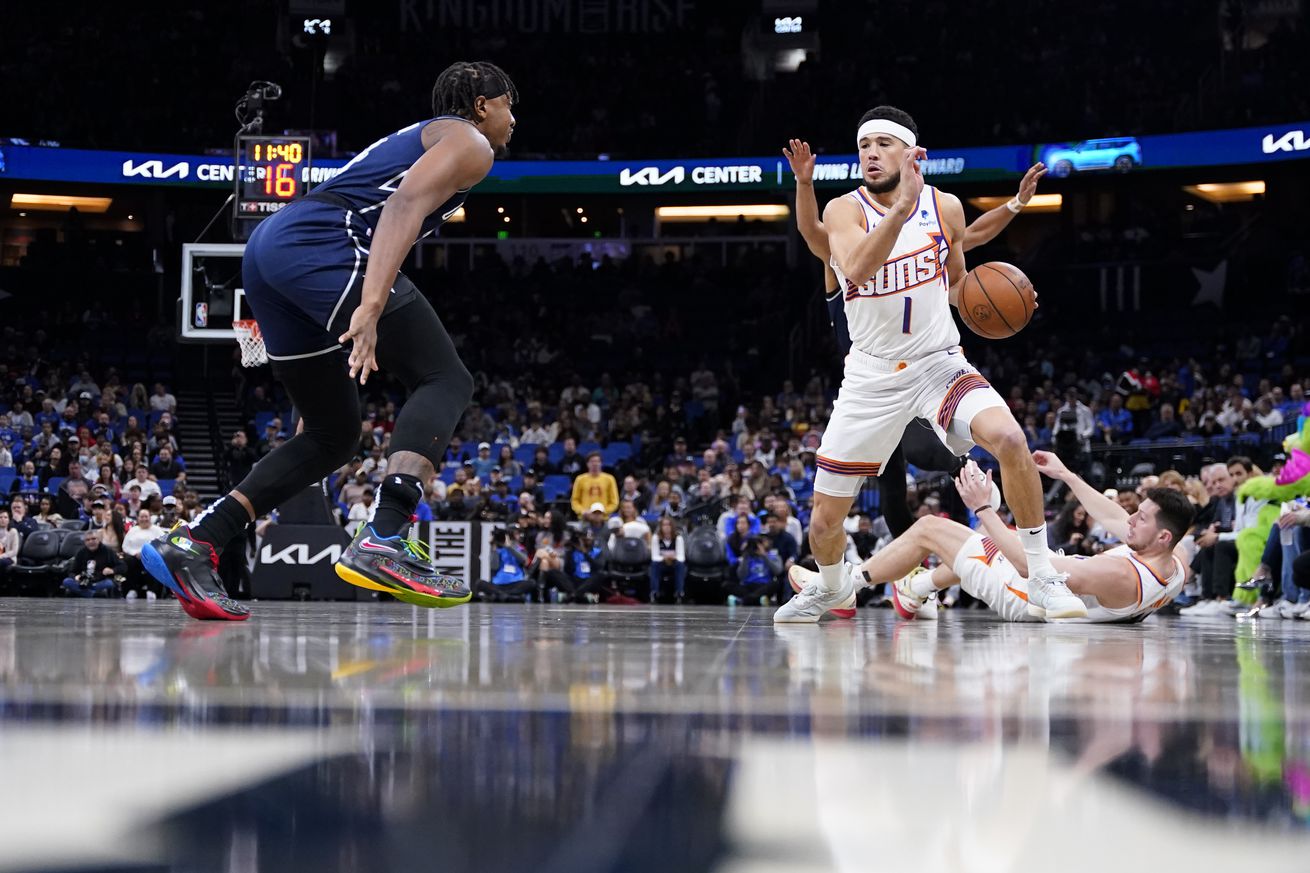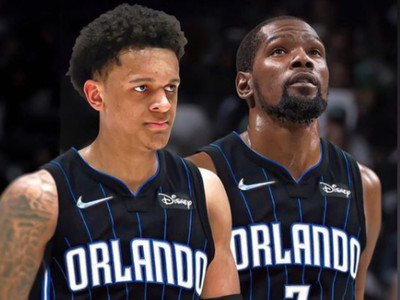
Orlando has an itch. Can the Suns help them scratch it?
The first round of the NBA playoffs is thinning the field, and with each exit comes an inevitable reckoning. Teams begin the introspective process, dissecting what went wrong, where cracks formed, and how they might rebuild stronger. Roster construction, once seen as vision, now feels like hindsight. And the flaws, previously ignored in the thrill of competition, stand exposed, demanding attention.
The Phoenix Suns know this cycle well.
One year ago, after being unceremoniously swept by the Minnesota Timberwolves, their postseason autopsy pointed toward a lack of ball security. Their fourth-quarter meltdowns had become the stuff of local legend, a tragic comedy for a team with championship aspirations. And as always, the summer brought its own familiar crisis: time for yet another head coach.
As teams across the league begin charting their course for next season, opportunities inevitably emerge. Some are scenarios where the Suns could not only assist those recalibrating franchises but also find mutually beneficial ways to strengthen their own roster.
The pieces aren’t fully in place just yet in Phoenix. We’re still less than 60 days from the NBA Draft and 61 from the start of free agency. The Suns don’t have a head coach, and the front office situation remains unsettled. There are loose ends to tie up before any major roster moves can take shape, especially moves that would align with whatever “identity” this team chooses to embrace.
That said, the offseason carousel has already begun, and with it comes fresh opportunity. The Orlando Magic are the latest team to fall, bowing out in five games to the defending champion Boston Celtics. Their season ends with a promising foundation. Paolo Banchero has proven himself a franchise cornerstone, while Franz Wagner is a dynamic complement alongside him.
Paolo Banchero against the Celtics:
29.4 PPG
8.4 RPG
4.2 APGFranz Wagner against the Celtics:
25.8 PPG
4.8 RPG
5.6 APGThe trio of Banchero, Wagner, and Suggs is a championship core. Now it’s all about finding the right role players for the Magic. pic.twitter.com/zKwXQXhX2C
— Jon Metler (@JonMetler) April 30, 2025
Their core is intact. Now comes the harder part: refinement.
Where did the Magic falter? Beyond the obvious challenge of facing a seasoned Boston squad, the glaring issue was three-point shooting. Orlando finished last in the NBA this season at just 31.8% from deep, and it somehow got worse in the playoffs, as they shot just 26.3% from beyond the arc against the Celtics. That’s 41-for-422. A number that large and that cold practically echoes.
This is where Phoenix could step in.
The Suns, for all their own flaws, possess a pair of reliable three-point shooters in Grayson Allen and Royce O’Neale; veterans who can either start or bring stability off the bench. If Orlando is serious about building around Banchero, Wagner, and Suggs with proper spacing, Allen and O’Neale could be highly desirable pieces.
And for the Suns? It’s a chance to rebalance the roster and extract value in return.
There are still several dominoes that need to fall within the organization before the Suns can determine whether moving off either Grayson Allen or Royce O’Neale actually makes sense. If the team somehow finds a way to buy out Bradley Beal, they’d escape the financial purgatory of the second apron. And with that relief comes flexibility. Allen’s contract—three years, $48.4 million—and O’Neale’s—three years, $32.6 million—suddenly become much more manageable in that scenario.
Every contending team needs mid-tier contracts on the books. They’re the glue that holds rosters together and creates options in future deals. Shedding Beal’s deal, even with some inevitable dead cap money, could give Phoenix the breathing room to retain those types of players rather than sacrificing them to stay cap compliant.
Operating under the assumption that Bradley Beal is off the books, let’s explore what a potential deal with Orlando might look like, and more importantly, who the Magic would actually be willing to part with in a way that benefits both sides. After all, it takes two aligned agendas to make a trade worthwhile.
Start with this: Orlando is roughly $20 million under the luxury tax and has a clear incentive to tweak the roster.
Ask any Magic fan who they’d move, and they’ll probably start by offering up their leftovers. You know, the pieces they no longer want. Chief among those is Kentavious Caldwell-Pope. He’s set to earn $21.6 million next season with a player option for the same amount in 2026–27. He was supposed to be the solution to their shooting woes, but he shot just 34.2% from deep during the regular season and plummeted to 26.1% in the playoffs. That’s not exactly what you call return on investment.
Magic really gave KCP all that money after Ant Man was bussin that ass all May 2024
— DREDADON (@tsavv14) April 30, 2025
But if the Magic are willing to move someone like Goga Bitadze—a 25-year-old big man set to make a manageable $15.9 million over the next two seasons—that could present a more compelling opportunity. Bitadze would bring interior defense and rebounding to a Suns team that has consistently lacked size and physicality up front.
Of course, Bitadze profiles more as a backup center than a long-term solution in the starting five. He’s more Nick Richards than Nic Claxton. That’s not a knock, it’s just the role he’s best suited for. Could he start in the NBA? Maybe. Should he? That’s another conversation. His value lies in his ability to anchor second units and provide competent minutes without breaking the cap sheet. But if the Suns are aiming higher—and they should be—the real swing would be Wendell Carter, Jr.
Carter, who just signed a three-year extension (with a team option on the back end) worth $58.7 million, is a far more intriguing possibility. Whether Orlando would even entertain that kind of deal is debatable. But if the Magic are desperate enough for perimeter shooting—and Phoenix offers a real solution in that department—they might be willing to at least have the conversation.
Carter appeared in 68 games this season, averaging a modest 9.1 points and 7.2 rebounds. Those numbers don’t exactly leap off the page. But his game has always been more about defensive positioning, switchability, and making the right plays, not box score dominance. He’s 26, entering his prime, and under a very reasonable contract. For a Suns team that has been undersized and underpowered up front, a player like Carter could shift the dynamic overnight.
Looking at the remainder of the Magic roster, not much really jumps off the page. Gary Harris? Meh. Cole Anthony? Pass. Tristan da Silva? Maybe. He’s intriguing, but far from a sure thing.
Yeah, these aren’t home runs. Trading for Goga Bitadze or even Wendell Carter Jr. isn’t going to shake the foundation of the franchise. These are singles. Maybe a double if Carter’s involved. But after the Suns have spent the last few years swinging for the fences—and striking out more often than not—a few smart, contact plays might be exactly what they need. It’s not flashy, but it’s controlled. And after what we’ve seen, controlled sounds like progress.
You want something that is a certified double?
Kevin Durant.

No, a one-for-one trade probably isn’t in the cards. But this is where things get interesting—where Orlando could serve as a third or fourth team in a multi-franchise blockbuster. The Magic have something every cap-strapped contender needs: space. Real, functional, weaponized cap space. And in a league now dominated by apron penalties and complicated tax rules, you need a team like Orlando to even think about pulling off something seismic.
Maybe the Magic do end up with Durant. Maybe they don’t. But if they are involved, there’s a very real chance Phoenix could walk away with something of value, whether it be Wendell Carter Jr. or Goga Bitadze, and perhaps someone else who fits what they’re trying to build from a third team. Plus draft capital.
That’s where teams like the Magic come into play. Rosters with foundational stars, cap flexibility, and a clearly defined need. Maybe they’re looking to tweak around the edges. Maybe they’re the missing piece in a larger puzzle.
So what do you think? Is a low-risk swap the smarter path, or would you rather see the Suns roll the dice again? Drop your thoughts in the comments.
Listen to the latest podcast episode of the Suns JAM Session Podcast below. Stay up to date on every episode, subscribe to the pod on Apple, Spotify, YouTube, YouTube Podcasts, Amazon Music, Podbean, Castbox.
Please subscribe, rate, and review.